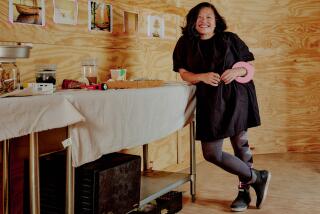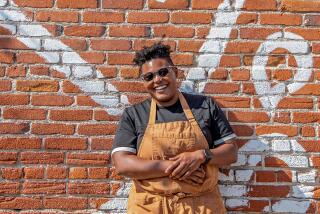‘Hippie Kitchen’ Gets a Five-Star Rating From the Hungry
- Share via
Out on the streets, Skid Row was awake and stirring. A homeless man poked through an open trash bin. A family crouched outside a makeshift shelter against a twisted fence made of corrugated metal. And Bernard Dunn was already hanging around the kitchen--the soup kitchen.
As Dunn peered hungrily through the doorway, volunteers were hurriedly chopping carrots, rinsing dozens of heads of lettuce and heating the huge pots that would cook up more than 1,000 morning meals.
Though serving time was still two hours away, another early bird, LeeRoy Williamson, entered the gated courtyard and peeked over Dunn’s shoulder. The two men were regulars here at the Catholic Worker “Hippie Kitchen,” a place that has been handing out free meals to the needy of downtown Los Angeles for 22 years.
“What are they having today?” Williamson asked eagerly.
“Spanish rice.”
Williamson made a face, turned away; he doesn’t eat rice--not of any kind.
Dunn grinned, unsympathetic.
“The Sizzler,” he suggested, “is serving steaks.”
*
Among the regulars, the Hippie Kitchen is revered. The line--which soon would encircle the courtyard and extend far down an adjoining alley, nearly 300 people in all--is strictly policed. No one gets cuts. No one saves places. Unlike other soup kitchens run by various Skid Row missions, Catholic Worker does not ask its patrons to listen to religious sermons. And the food--well, it’s as good as the volunteers are able to offer.
“If a thousand T-bone steaks were donated here,” Dunn said, vouching for the kitchen’s integrity, none would be sold for profit or eaten by unscrupulous staff. “(The poor) would get it. And I don’t know about other places.”
The setting is surprisingly elegant--a landscaped courtyard, accented by wall murals, and a kitchen as spotless as a Sunset magazine model. The volunteers, seven in all, cooperate equally in running it and even live together at a Catholic Worker home in Boyle Heights.
Founded in New York in 1933, the organization runs about 100 kitchens nationwide, combining Christian ideals with collective social conscience, said volunteer Kieran Prather, a former monk who learned of the chapter here while in jail after a protest march.
The group has no formal connection with the Catholic Church and relies entirely on private contributions to survive, Prather said. Its volunteers, who tend to come and go over the years, receive room and board and $6 a week. As it so happens, many of those running the Los Angeles kitchen are--and have been--”young white kids with long hair,” as one volunteer put it.
Hence the nickname, Hippie Kitchen.
The fare is mostly donated lettuce and vegetables, except for rice and beans that are purchased in 100-pound bags. Serving three meals a week, the kitchen offers its choicest selections--tuna noodle casserole, black-eyed peas or chili-bean stew, for example--early in the month, when fewer meals are served, said volunteer Peter Stiehler.
By month’s end, when welfare recipients tend to run out of money, less-popular black beans, split peas and lentils go into the stew. “At the end of the month there’s no meat--no way, no how,” Stiehler said, chopping cherry tomatoes for the day’s salad. “Say we served tuna noodle late in the month--we’d just get mobbed.”
*
The line moves quickly once the serving starts. As the patrons pass through the kitchen, volunteers gather along the counter assembly-line style, ladling out stew, serving up salad, offering buttered bread, rolls and cups of water. At the exit door, each person gets a plastic spoon, and outside there is a table with salt and a colander of chili peppers.
“A chili pepper for anyone?” The volunteer there, wearing a fedora in the harsh sunlight, exudes good cheer. “How about a jalapeno? That’ll wake your mouth up.”
Laura Williams, 31, one of only a few homeless women in the line, was grateful not only for the meal but also for the attractive setting--the result of donated plants, diligent fund-raising efforts and a generous contractor’s low bid. “The food is delicious,” she said, “and it’s a nice atmosphere. Being homeless, it’s nice to see some of God’s beauty when you come here.”
James Willis, 30, a Vietnam veteran whose home is a sleeping bag on 5th Street, was soon joining the crowd of diners at outdoor tables topped by oversized umbrellas. “This gives you a certain amount of escape from what’s down the block,” he said. “You could even go so far as to say they serve a balanced diet. . . . What they’re doing for the community is fabulous.”
As the line shrinks, many patrons go back for seconds, even thirds. The kitchen closes by noon--or slightly earlier if the food runs out--but the clientele seems to leave a little better off, a little happier.
Williamson was not rushing up for seconds this day, eschewing the hated rice, but he bestowed on the eatery his highest praise--tantamount to a five-star rating. “If I had a lot of money,” he began, his eyes shining. “If I hit the lottery . . . I would donate to this place.”
More to Read
Sign up for Essential California
The most important California stories and recommendations in your inbox every morning.
You may occasionally receive promotional content from the Los Angeles Times.










